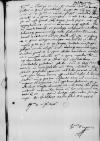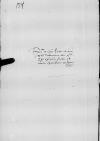List #2075
Ioannes DANTISCUS do Tiedemann GIESEHeilsberg (Lidzbark Warmiński), 1539-02-24
Regest polski:
Dantyszek zapoznał się z wyjaśnieniami rady Gdańska i Johanna von Werden. Zgodnie z przewidywaniami adresata, rozliczenie źle o nich świadczy. Dantyszek spodziewa się pogorszenia sytuacji po najbliższym sejmie koronnym w Krakowie. Po rozważeniu, co napisać królowi [Zygmuntowi I], decyduje, że list należy sformułować tak, jak uczynił to Giese, prosi jednak, by dodać, że to, co on sam w tych sprawach napisał, napisał we wspólnym imieniu [członków Rady Pruskiej].
Dantyszek obiecuje dopilnować, by na sejmie zwrócono Giesemu wiatyk dany gońcowi.
Dantyszek przesyła list doktora [Stanisława] Hozjusza. Obawia się wojny z Turcją, wywołanej gniewem sułtana [Sulejmana Wspaniałego] z powodu małżeństwa Izabelli [Jagiellonki z Janem Zápolyą]. Sułtan zamierza zająć lub nękać Węgry. Ponieważ jego flota uległa zniszczeniu, zamierza walczyć wyłącznie na lądzie.
| odebrano 1539-02-26 Rękopiśmienne podstawy źródłowe:
Publikacje:
| ||||||||
Tekst + aparat krytyczny + komentarz Zwykły tekst Tekst + komentarz Tekst + aparat krytyczny
Reverendissimo in Christo Patri et Domino, domino Tidemanno Dei gratia episcopo Culmensi, fratri et amico carissimo ac honoran(do) or honoran(dissimo)⌈honoran(do)honoran(do) or honoran(dissimo)⌉
Reverendissime in Christo Pater et Domine, frater et amice carissime et honoran(de) or honoran(dissime)⌈honoran(de)honoran(de) or honoran(dissime)⌉.
Salutem et fraternam commendationem.
Legi ea omnia, quae Gdanenses et dominus Ioannes a Werden scripsit. Calculus illos, ut recte Dominatio Vestra Reverendissima omina written over e⌈eaa written over e⌉tur, male habet. Eo omisso non est, quod maiestati regiae scribi possit, nisi ut expostulemus, verum non convenit neque expedit. Ne tamen muti taceamus et paulo post indigniora intolerabilioraque patiamur (quod certe futurum ex conventu Cracoviensi arbitror), omnino sic scribendum esse, ut posterius Dominatio Vestra Reverendissima concepit, censeo. Velim tamen et illud inseri, quod ea, quae in iis scripsi, hortatu omnium scripserim. Idipsum minime odiosum erit dabitque argumento vigorem.
Viaticum, quod Dominatio Vestra Reverendissima dabit veredario, curabitur, ut in novissimo conventu Dominationi Vestrae Reverendissimae rependatur. Non enim ex dignitate est, ut illud vel alius tabellarius a civitatibus petatur.
Mitto domini doctoris Hosii litteras. Vereor, ne nostra Isabella contra Turci voluntatem in Hungariam profecta gravia nobis bella pariat. Cum illa nos, qui Turci amici esse volebamus, hostes declaravimus. Scribitur mihi, quod pro hac instante vere vel omnem occupare Hungariam, vel oppetere statuerit, et quod attritus classe, deinceps non nisi terra illum pugnaturum. Vehementer aiunt eum hoc matrimonio irritatum etc.
Dominationem Vestram Reverendissimam diutissime optime valere summopere cupio.
Ex Heilsberg, XXIIII Februarii MDXXXIX.
Reverendissimae Dominationis Vestrae frater integerrimus Ioannes episcopus Varmiensis scripsit


 BCz, 245, p. 134
BCz, 245, p. 134